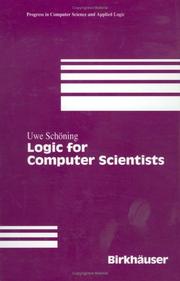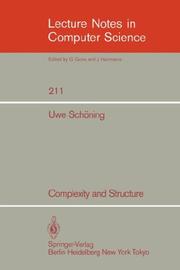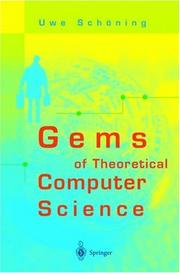| Listing 1 - 10 of 10 |
Sort by
|

ISBN: 0817634533 3764334533 0817647627 0817647635 9780817647629 9780817647636 Year: 2008 Publisher: Boston: Birkhäuser,
Abstract | Keywords | Export | Availability | Bookmark
 Loading...
Loading...Choose an application
- Reference Manager
- EndNote
- RefWorks (Direct export to RefWorks)
This book introduces the notions and methods of formal logic from a computer science standpoint, covering propositional logic, predicate logic, and foundations of logic programming. It presents applications and themes of computer science research such as resolution, automated deduction, and logic programming in a rigorous but readable way. The style and scope of the work, rounded out by the inclusion of exercises, make this an excellent textbook for an advanced undergraduate course in logic for computer scientists. This is a short introductory book on the topic of propositional and first-order logic, with a bias towards computer scientists…. Schöning decides to concentrate on computational issues, and gives us a short book (less than 170 pages) with a tight storyline…. I found this a nicely written book with many examples and exercises (126 of them). The presentation is natural and easy to follow…. This book seems suitable for a short course, a seminar series, or part of a larger course on Prolog and logic programming, probably at the advanced undergraduate level. — SIGACT News Contains examples and 126 interesting exercises which put the student in an active reading mode.... Would provide a good university short course introducing computer science students to theorem proving and logic programming. — Mathematical Reviews This book concentrates on those aspects of mathematical logic which have strong connections with different topics in computer science, especially automated deduction, logic programming, program verification and semantics of programming languages.... The numerous exercises and illustrative examples contribute a great extent to a better understanding of different concepts and results. The book can be successfully used as a handbook for an introductory course in artificial intelligence. — Zentralblatt MATH.
Programming --- Computer science --- Mathematical logic --- Logic, Symbolic and mathematical. --- Logic programming. --- Computer science. --- Mathematical Logic and Formal Languages. --- Mathematical Logic and Foundations. --- Algebra of logic --- Logic, Universal --- Symbolic and mathematical logic --- Symbolic logic --- Mathematics --- Algebra, Abstract --- Metamathematics --- Set theory --- Syllogism --- Informatics --- Science --- Mathematical logic. --- Logique mathématique --- Programmation logique --- Logique des prédicats

ISBN: 3540160795 3540397590 Year: 1985 Volume: vol 211 Publisher: Berlin Heidelberg New York Tokyo Springer
Abstract | Keywords | Export | Availability | Bookmark
 Loading...
Loading...Choose an application
- Reference Manager
- EndNote
- RefWorks (Direct export to RefWorks)
681.3*F1 --- Probability and statistics: probabilistic algorithms (including Monte Carlo);random number generation; statistical computing; statistical software (Mathematics of computing) --- Computation by abstract devices --- Mathematical logic: computability theory; computational logic; lambda calculus; logic programming; mechanical theorem proving; model theory; proof theory;recursive function theory--See also {681.3*F11}; {681.3*I22}; {681.3*I23} --- 681.3*F41 Mathematical logic: computability theory; computational logic; lambda calculus; logic programming; mechanical theorem proving; model theory; proof theory;recursive function theory--See also {681.3*F11}; {681.3*I22}; {681.3*I23} --- 681.3*F1 Computation by abstract devices --- 681.3*G3 Probability and statistics: probabilistic algorithms (including Monte Carlo);random number generation; statistical computing; statistical software (Mathematics of computing) --- Computer science --- 681.3*G3 --- 681.3*F41 --- Computer software. --- Combinatorics. --- Algorithm Analysis and Problem Complexity. --- Combinatorics --- Algebra --- Mathematical analysis --- Software, Computer --- Computer systems --- Recursive functions
Book
ISBN: 3506713213 Year: 2004 Publisher: Paderborn F. Schöningh
Abstract | Keywords | Export | Availability | Bookmark
 Loading...
Loading...Choose an application
- Reference Manager
- EndNote
- RefWorks (Direct export to RefWorks)
Book
ISBN: 3411156414 9783411156412 Year: 1992 Publisher: Mannheim: WissenschaftsVerlag,
Abstract | Keywords | Export | Availability | Bookmark
 Loading...
Loading...Choose an application
- Reference Manager
- EndNote
- RefWorks (Direct export to RefWorks)
Book
ISBN: 9783411140138 3411140135 Year: 1992 Publisher: Mannheim: Bibliographisches Institut,
Abstract | Keywords | Export | Availability | Bookmark
 Loading...
Loading...Choose an application
- Reference Manager
- EndNote
- RefWorks (Direct export to RefWorks)
Book
ISBN: 9783827402325 3827402328 Year: 1997 Publisher: Heidelberg: Spektrum,
Abstract | Keywords | Export | Availability | Bookmark
 Loading...
Loading...Choose an application
- Reference Manager
- EndNote
- RefWorks (Direct export to RefWorks)
Digital
ISBN: 9783486594058 9783486587234 Year: 2009 Publisher: Berlin ;; Boston Oldenbourg Wissenschaftsverlag
Abstract | Keywords | Export | Availability | Bookmark
 Loading...
Loading...Choose an application
- Reference Manager
- EndNote
- RefWorks (Direct export to RefWorks)

Abstract | Keywords | Export | Availability | Bookmark
 Loading...
Loading...Choose an application
- Reference Manager
- EndNote
- RefWorks (Direct export to RefWorks)
Automatic theorem proving --- 681.3*F0 --- Automated theorem proving --- Theorem proving, Automated --- Theorem proving, Automatic --- Artificial intelligence --- Proof theory --- Computerwetenschap--?*F0 --- Computer science --- Programming
Book
ISBN: 3865416489 9783865416483 386541527X 9783865415271 Year: 2013 Publisher: Berlin : Lehmanns Fachbuchhandlung GmbH, Abt. Verlag,
Abstract | Keywords | Export | Availability | Bookmark
 Loading...
Loading...Choose an application
- Reference Manager
- EndNote
- RefWorks (Direct export to RefWorks)
Book
ISBN: 0521442206 Year: 1993 Publisher: Cambridge Cambridge University Press
Abstract | Keywords | Export | Availability | Bookmark
 Loading...
Loading...Choose an application
- Reference Manager
- EndNote
- RefWorks (Direct export to RefWorks)
Computer science --- Computational complexity --- #KVIV:BB --- 681.3*F11 --- 681.3*F12 --- 681.3*F13 --- Complexity, Computational --- Electronic data processing --- Machine theory --- Models of computation: automata; bounded action devices; computability theory; relations among models; self-modifying machines; unbounded-action devices--See also {681.3*F41} --- Modes of computation: alternation and nondeterminism; parallelism; probabilistic computation; relations among modes; relativized computation --- Complexity classes: complexity hierarchies; machine-independent complexity; reducibility and completeness; relations among complexity classes; relations among complexity measures (Computation by abstract devices)--See also {681.3*F2} --- 681.3*F13 Complexity classes: complexity hierarchies; machine-independent complexity; reducibility and completeness; relations among complexity classes; relations among complexity measures (Computation by abstract devices)--See also {681.3*F2} --- 681.3*F12 Modes of computation: alternation and nondeterminism; parallelism; probabilistic computation; relations among modes; relativized computation --- 681.3*F11 Models of computation: automata; bounded action devices; computability theory; relations among models; self-modifying machines; unbounded-action devices--See also {681.3*F41} --- Logic, Symbolic and mathematical --- Logique mathématique --- Proof theory --- Théorie de la démonstration --- Complexité de calcul (informatique) --- Logique mathématique. --- Théorie de la démonstration. --- Logic, Symbolic and mathematical. --- Proof theory. --- Théorie de la démonstration --- Computational complexity. --- Informatique theorique --- Algorithmique --- Complexite
| Listing 1 - 10 of 10 |
Sort by
|

 Search
Search Feedback
Feedback About UniCat
About UniCat  Help
Help News
News